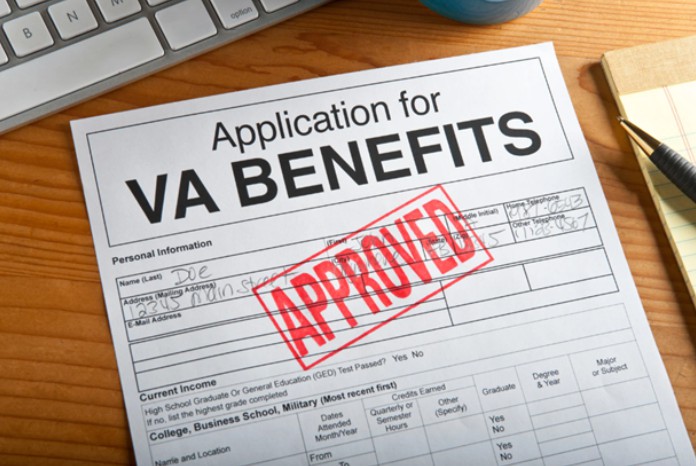The Department of Veterans Affairs is expected to process a record-breaking number of disability benefits compensation and pension ratings claims in 2025.
Even so, the VA reports a large number of backlogged claims, with some 141,890 claim pending past the 125-days mark. Combine those numbers with an overall claims rejection rate of 36% and many veterans could be left without the resources they need to survive.
Faced with the overall complexity of the VA claims process and excessive wait times, veterans often search for ways to ensure a speedy and favorable rating. The mounting financial strain faced by veterans left in claims limbo can leave them vulnerable to VA claims predators who vow to assist veterans but are really only looking out for themselves.
What kinds of tactics do bad actors use and what can veterans do to protect themselves? The expert claims consultants at Veterans Guardian help us break down the most common tactics claim sharks use and how to recognize them.
How to Spot a VA Claims Bad Actor
Reputable VA claims companies offer outcome-based pricing that ensures clients pay reasonable fees only if their claim is successful. Their focus is on helping veterans preserve their privacy and dignity while also gaining the financial support they’re due. Offerings like no-hassle agreement termination and “arms length” medical assessments further underscore a commitment to ethical practices.
Bad actors, however, prioritize profits over people. You can often spot bad actors or “claim sharks” based on how they advertise and operate.
For instance, claim sharks may:
- Charge arbitrary or excessive fees
- Require payment up front or ask you to sign over future benefits as collateral
- Make outlandish promises regarding application approval and benefit amounts
- Fail to disclose free services available to veterans
- Sell your personal data to third parties
- Make it difficult for clients to end their agreement
Learning more about how VA claims predators work can help you avoid bad actors and safeguard your financial future.
Common VA Claims Predator Tactics
There are some common tactics VA claims predators use to try to justify their exorbitant fees. Ranging from pressure-based ploys to outright lies, these tactics prey on veterans’ financial uncertainty and ill health to generate illegal income.
- Guaranteeing a Positive Outcome
- Offering Expedited Processing
- Claiming Special Relationships/Access
- Requiring Payment or Fees Upfront
- No Clear Data or Privacy Policy
- Using Offshore Call Centers
1. Guaranteeing a Positive Outcome
Beware of consultants who guarantee a 100% disability rating or sky-high benefits. The VA’s ratings process is intricate and unpredictable, and outcomes are determined solely by the VA and on a case-by-case basis.
That said, a reputable disability claim company can improve your chances of a successful outcome and reduce potential delays by helping you gather necessary evidence and ensuring your application is complete before filing.
2. Offering Expedited Processing
Illegal VA claims scammers do not have any special way to make the claims process go faster.
There are several ways to pursue expedited claims processing, but they’re all options you can pursue on your own or in partnership with an accredited VSO or trusted private consultant.
-
- Request priority review. Applicants who are over 77 years of age, have a terminal illness, or are experiencing financial hardship can use VA Form 20-10207 to request priority processing.
- Use the Decision Ready Claim (DRC) program. This program promises a claim decision within 30 days, but it’s only available to veterans seeking an increase of previously awarded disability compensation. You can only apply through the DRC by working with an accredited VSO or private consultant, and your claim must be “decision-ready,” which requires a comprehensive file that contains all relevant medical records and other supporting evidence.
- File electronically. The claims process may be slightly faster if you file an eClaim versus submitting paperwork by mail.
- Submit complete records. Missing paperwork is one of the most common reasons a VA claim is delayed or denied. Be sure all your evidence is in place, including both federal and private medical records. A VSO rep or legitimate claims consulting firm can help you understand what kind of evidence you may need.
3. Claiming Special Relationships/Access
Scammers frequently claim they “know someone at the VA” or have inside information that will help you receive benefits quickly.
The truth is that all claims are meticulously reviewed by the VA and approved or denied based solely on the validity of the claim itself. There is no way to legally influence the outcome of that review.
4. Requiring Payment or Fees Upfront
Bad actors may demand payment upfront before you know what services you’ll receive or if your case will have a positive result. They may even encourage you to take out a loan or borrow against a savings or retirement policy to pay their invoice.
Reputable firms work on a contingency basis. That means they don’t get paid until you do. Their fees are also reasonable and in line with standard fee schedules charged by accredited attorneys.
5. No Clear Data or Privacy Policy
All reputable companies should have clear data and privacy policies that outline:
- How data is being collected
- How that data may be used
- Who else may have access to that data
- How you can access, correct, and/or erase that data in the future
Good actors are also transparent about the measures they’re taking to protect your personal information. This includes disclosing what digital safeguards are in place to help prevent data breaches that could leave you vulnerable to identity theft and fraud.
Reputable consultants also shouldn’t ask you for your VA.org login information or bank account information. Bad actors often request these sensitive details to claim your benefits themselves.
6. Using Offshore Call Centers
Bad actor schemes can rely on non-US-based call centers. In fact, a bill is currently in Congress that would help prohibit the use of call centers overseas by private companies or consultants that assist veterans with claims.
If you receive an unsolicited call from a foreign number promising benefits, offering help with a benefits claim, or asking for upfront fees, this is a red flag and a sign that the company may not be legitimate.
How to Protect Yourself
The best way to safeguard your existing assets and VA benefits is to know how to protect yourself from bad actors. This includes learning which advocates truly have your best interests at heart and how you can spot potential red flags.
Beware of anyone charging for guaranteed VA claims approval
Accredited VSO representatives will never charge a fee for claims assistance. Private consulting firms and licensed attorneys should never charge unless you receive a benefit increase.
There are some helpful fee-based companies that will work with you to ensure you have your paperwork in order, but they do not guarantee results or resort to extortion.
The most important points to understand are:
- No one can guarantee an increase or claim approval
- There are free options available
- Paid options should only require payment if you see a benefit increase
Never agree to move or hide assets
Some unscrupulous scammers will try to help you qualify for benefits by moving your savings into an annuity or trust.
This kind of fraud could land you in legal hot water, and you will likely have to repay benefit payouts based on falsified financial information.
Keep your information private
Don’t give unverified people sensitive information, including your social security number, bank account information, or login credentials for the VA and eBenefits sites.
Don’t fall for aggressive advertisements and sales language
VA claims predators only make money when someone falls for their scams. They’re heavily motivated to bring you on board, which means they’ll often resort to a deluge of emails, texts, and phone calls.
Time-sensitive pitches and threats like “only available for a limited time” and “act now or you could lose your benefits forever!” are never used by the VA, legitimate VSO representatives, reputable attorneys, or trustworthy private consultants.
Double-check contact information
Scammers may use fake phone numbers (including cloning numbers or falsifying called ID) and websites to look like they’re from the VA when they’re actually not.
Verify accreditation and representative identity by:
- Reading verified reviews for consulting companies, law firms, and attorneys
- Researching veteran forums to read about experiences and tips from other veterans
- Checking directly with your local VSO
- Signing into your VA account to check for appointed representatives
- Using the VA’s accreditation search tool
Review documents before signing
Fake VA claims agents may encourage you to sign blank forms or paperwork, allowing them to act on your behalf.
Never sign a blank document, and take your time to pore over the fine print of completed forms before agreeing to the terms.
Know where to look for extra help
There are some 15.8 million military veterans in the United States, and VSOs aren’t equipped to help them all.
Legitimate veteran claims consulting firms charge modest fees to help you properly prepare your claim and achieve the maximum VA rating possible for your unique situation. Their in-depth knowledge of the difficult claims process can help relieve some of the mental and emotional burden that comes with applying for disability compensation.
If you suspect you’ve been approached or scammed by a VA claims predator, you can report them to the VA by calling 1-833-38V-SAFE (1-833-388-7233) or visiting VSAFE.gov.





